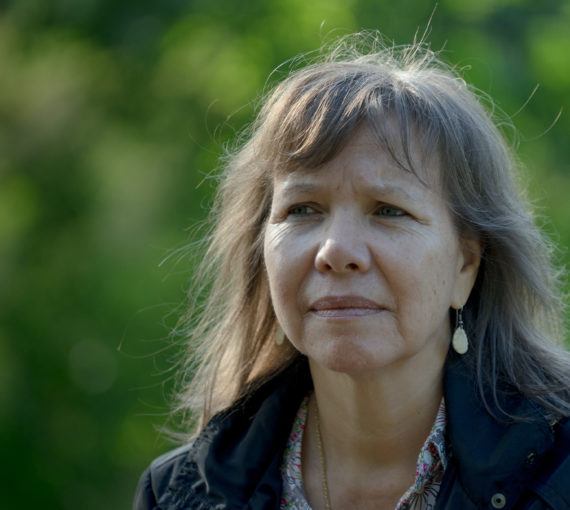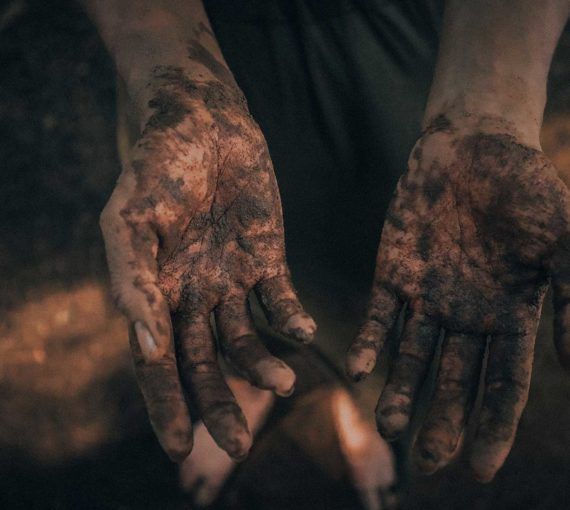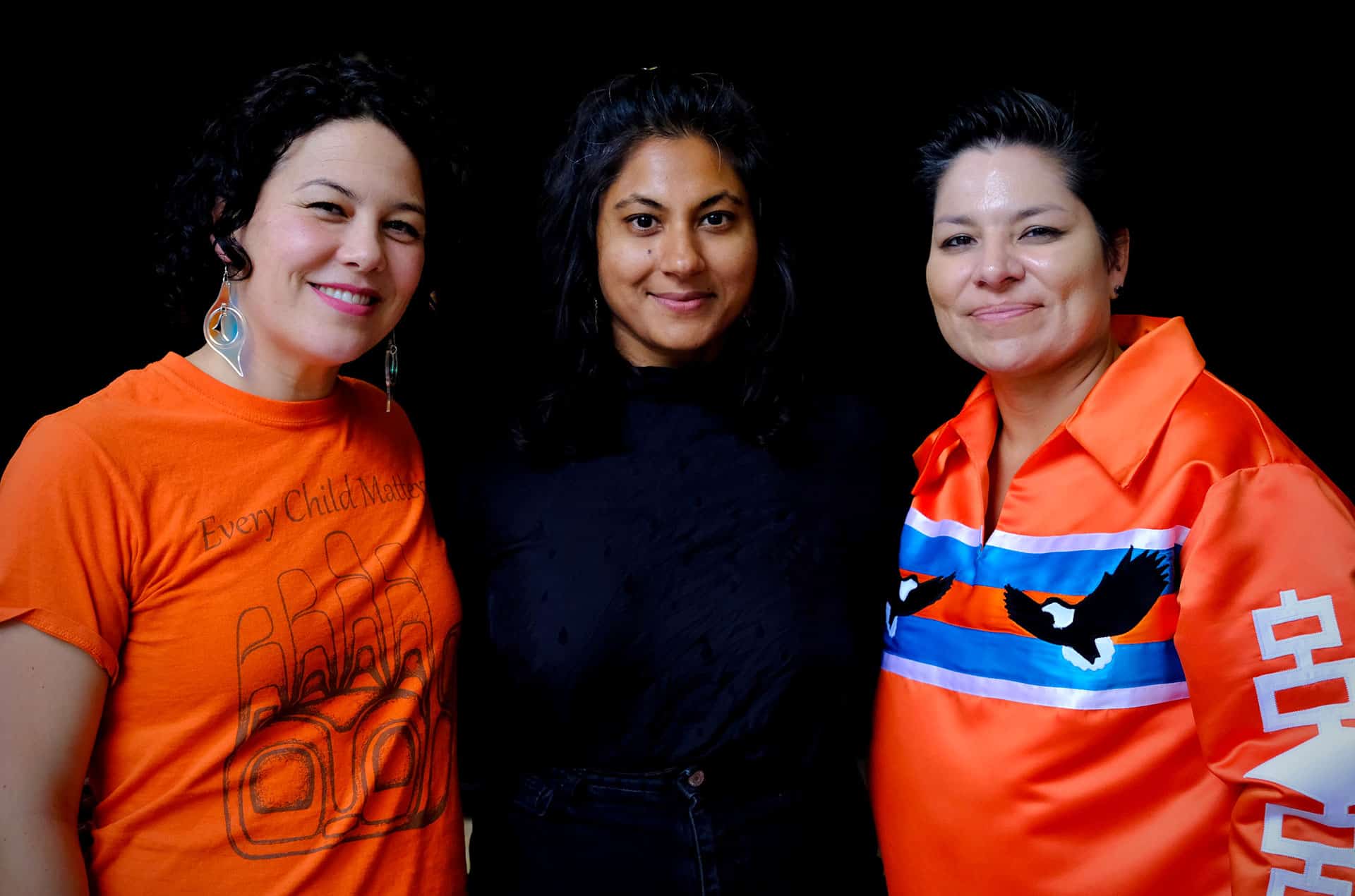
Severn Cullis-Suzuki, Sabaa Khan and Grand Chief Kahsennénhawe Sky-Deer of the Mohawk Council of Kahnawà:ke. (Photos: Ambre Giovanni and Alexandre St-Amant)
On September 29, 2023, as the POP Montreal International Music Festival coincided with the National Day for Truth and Reconciliation, Grand Chief Kahsennenhawe Sky-Deer of the Mohawk Council of Kahnawà:ke sat down with David Suzuki Foundation executive director, activist and linguistic anthropologist Severn Cullis-Suzuki to discuss the importance of revitalizing Indigenous languages and preserving and advancing First Nations world views.
“We’re here to celebrate the resurgence of Indigenous languages and cultures around the world,” said David Suzuki Foundation director general for Quebec and Atlantic Canada Sabaa Khan, who moderated the conversation. “In a time of multiple crises, those languages and cultures are a source of inspiration, bringing humanity together and serving as repositories of traditional knowledge, customs and beliefs that words in other languages can never capture.”
The Grand Chief offered an opening prayer in which she thanked the land and expressed gratitude toward all of creation, including water, plants, food, forest animals and the sky.
“Those elements are tied to our everyday lives. In our culture, our survival would be threatened if we stopped showing gratitude,” she explained.
Indigenous women have a special connection with the moon, for example, as it controls the life-giving cycle of birth. The same is true for the stars, which play a central role during ceremonies.
Celebrating Indigenous languages and their connection to the environment
While Indigenous Peoples have been feeling the impact of the sixth mass extinction since the arrival of settlers, we’re only now beginning to understand that there is a real threat to our future if we continue on our current path.
“The Seventh Generation Principle states that all decisions we make today have an impact on the future,” Sky-Deer said. “If we don’t change the way we think, the way we talk and the way we do things, what are we going to leave to our children and grandchildren? What will our legacy be and what will their future look like if all we’re interested in is wealth and consumption? Mother Earth is warning us we must change.”
Cullis-Suzuki pointed out that we must use all the tools in our toolkit. Indigenous languages are part of that toolkit, and it’s crucial that we maintain those connections.
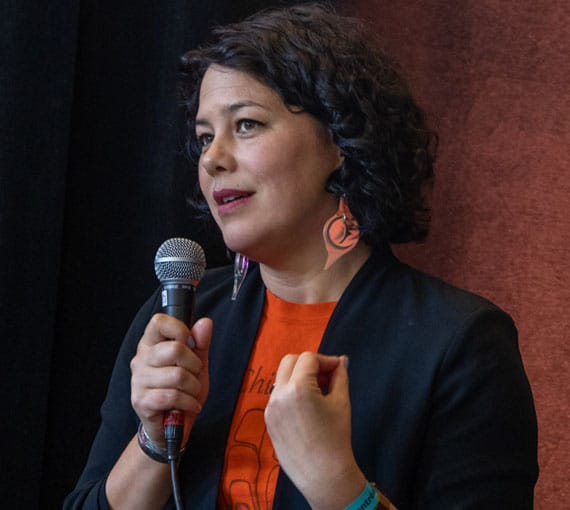
Language connects us both physically, through the sound waves our bodies produce, and spiritually, through the bonds we forge when we communicate. It’s not only a sacred act, but also our connection to our ancestors.
Severn Cullis-Suzuki
As Indigenous Peoples around the world fight to preserve their lands, keeping their languages alive helps them assert their resistance and strengthen their connections to the land. It’s also their inalienable right, as language comes from the land and is intrinsically linked to it.
“Language connects us both physically, through the sound waves our bodies produce, and spiritually, through the bonds we forge when we communicate,” Cullis-Suzuki said. “It’s not only a sacred act, but also our connection to our ancestors.”
Taking action
To help revive Indigenous languages and keep them alive, both Sky-Deer and Cullis-Suzuki are taking concrete action in their respective communities, Kahnawà:ke and Haida Gwaii.
Sky-Deer attended a Mohawk immersion program established in the early 1980s. To this day, children and adults alike can explore different learning opportunities as part of the program. Mohawk Council of Kahnawà:ke employees, for instance, can register for a five-year language and culture training program and attend classes during working hours.
“I’m proud to be able to speak my language,” Sky-Deer said. “When I visit various communities as Grand Chief and I ask people if they can speak theirs, I see the pride that shines in their eyes when they say yes and the emptiness they feel when they say no.”
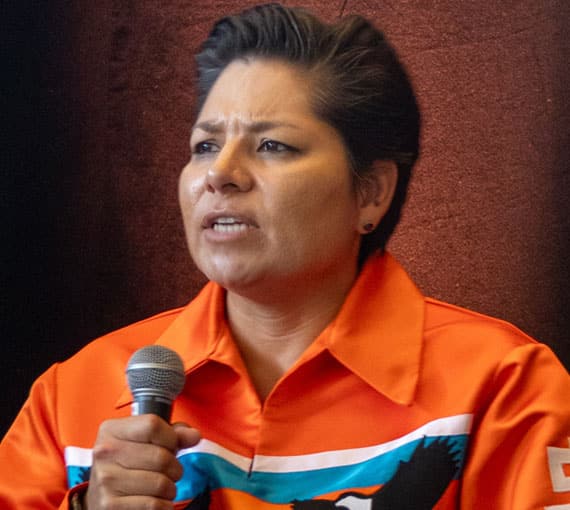
The Seventh Generation Principle states that all decisions we make today have an impact on the future. If we don’t change the way we think, the way we talk and the way we do things, what are we going to leave to our children and grandchildren?
Grand Chief Kahsennénhawe Sky-Deer
Sky-Deer added that Indigenous Peoples rely heavily on aunts, grandmothers and other family members who speak the language fluently to pass it on to future generations. She also mentioned that her community wants to see Mohawk used in everyday situations, like banking and grocery shopping.
What’s more, Cullis-Suzuki pointed out that the Haida language had disappeared from Haida Gwaii for decades as a result of colonization and children being forced into residential schools. Older generations, however, began to speak the language again in the 1970s, and a number of programs have since been established to revive it.
Cullis-Suzuki is currently working with the community and encouraging young people to learn their language. The new language centre and nine-course university program are great places for them to reconnect with their heritage.
Giving future generations a fresh start
For over a century, Indigenous children were removed from their homes, forcibly taken to residential schools throughout Canada and subjected to abuse. Their languages were devalued and they were denied the love and care from their families and communities they needed. That cycle of abuse has led to the intergenerational trauma many Indigenous people still experience.
Yet Sky-Deer is optimistic about reconciliation. She is convinced we can build a brighter future once we better understand the past and know how to be allies. She said, “Language and culture will help us on our path to healing because we’re all spiritual beings.”
To start on our own individual paths toward reconciliation, we can learn more about Indigenous communities, the struggles they still face, the Indian Act and its consequences and the National Inquiry into Missing and Murdered Indigenous Women and Girls. Sky-Deer is also encouraging everyone to learn more about the community through events like powwows and to foster friendships between Indigenous and non-Indigenous people.
“It’s truly amazing! Despite everything that’s happened,” Cullis-Suzuki said. “Such generosity and openness are born from a profound sense of identity and honour.”
